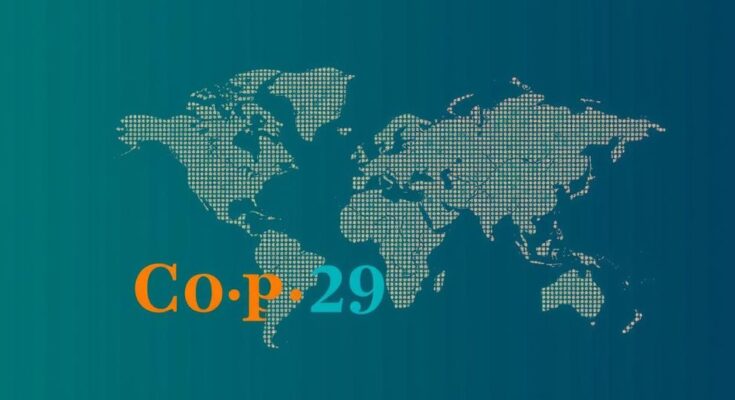On November 24, nearly 200 nations approved a climate finance agreement committing developed countries to $300 billion annually by 2035 for poorer nations to combat climate change. Despite criticisms from developing nations regarding the insufficiency of the funds—demanding at least $500 billion—the deal was reached after intense negotiations. While the agreement marks a step forward, it reflects ongoing tensions and unmet needs in global climate finance.
On November 24, nearly 200 countries finalized a contentious climate finance agreement, whereby developed nations commit to providing $300 billion annually by 2035 to assist poorer nations combat climate change. This agreement emerged after extensive negotiations in Azerbaijan, amidst significant criticisms from developing nations that labeled the financial commitment as insufficient compared to their demands of at least $500 billion. Despite the discontent, countries agreed to the deal, signifying an essential but imperfect step forward in addressing global climate crises.
The new pact escalates the previous pledge of $100 billion per year, previously provided by wealthy nations, which was set to expire. However, developing nations expressed disappointment over the proposed aid, notably citing India’s condemnation of the agreement as “abysmally poor” and merely an “optical illusion”. Critics, such as Sierra Leone’s Jiwoh Abdulai and Nigeria’s Nkiruka Maduekwe, contended that the agreement reflects a lack of commitment from wealthier countries towards supporting those most affected by climate change. While the agreement aims to amass a broader target of $1.3 trillion per year in climate-related funding, much of this support is expected to materialize from private entities rather than direct governmental contributions.
UN climate chief Simon Stiell acknowledged the limitations of the agreement, urging a collaborative approach towards a more sustainable outcome, while UN Secretary-General Antonio Guterres expressed a desire for more ambitious results. Despite the mixed reception, U.S. President Joe Biden heralded it as “a historic outcome”, while EU climate envoy Wopke Hoekstra termed it as the beginning of a “new era for climate finance”. Ultimately, the agreement signals the complexities and challenges inherent in global climate negotiations, particularly regarding financial commitments from wealthier countries to emerging economies.
The global climate finance agreement negotiated at COP29 reflects ongoing tensions between developed and developing nations regarding financial responsibilities in combating climate change. Poorer nations have consistently pushed for more substantial aid to address climate adaptation and resilience needs, especially as extreme weather events exacerbate global inequalities. The backdrop of high-stakes negotiations and differing national interests continues to complicate these discussions, as nations navigate the challenges posed by climate change against a backdrop of political and economic pressures. The role of emerging economies, such as China, presents further complexities as there is an expectation for contributions from these nations, while historically they have operated independently in funding matters. This agreement reveals both the achievements and limitations of international cooperation in addressing climate challenges.
The recent climate finance deal, while marking a significant step, has fallen short of the expectations of vulnerable nations who sought greater financial support from wealthier countries. The $300 billion commitment, although an improvement, remains inadequate when benchmarked against the demands of developing nations. This agreement underlines the ongoing struggle within global climate negotiations to reconcile the interests of diverse nations, indicating both the complexities of cooperation and the urgent need for increased financial resources to combat climate change effectively. Future discussions and negotiations will be critical in determining the efficacy of this framework in addressing the profound impacts of climate change.
Original Source: www.lemonde.fr




